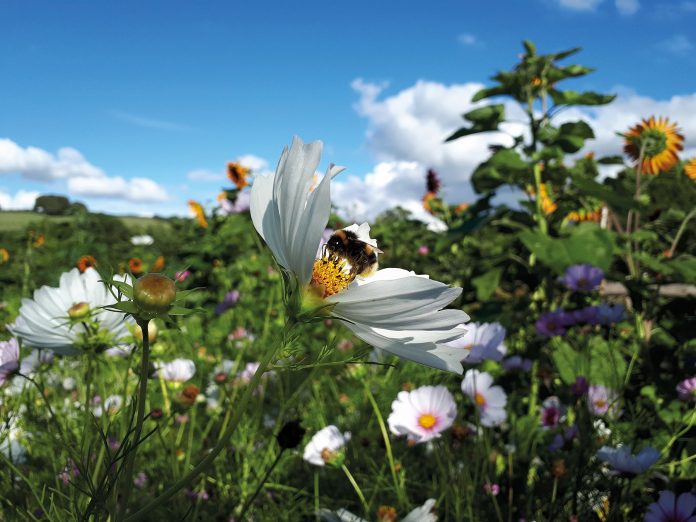On Wednesday 20th March, the first day of spring, Dorset Wildlife Trust (DWT) is launching its biggest ever campaign, Get Dorset Buzzing, sponsored by the Gardens Group and Wessex Water. The campaign is in response to the well-reported decline of pollinators nationally and aims to get over 2,000 people in Dorset pledging to do at least one thing in their garden to help create space and food for pollinators to thrive again.
DWT will be sending out free packs to those who pledge to help, which includes a wall planner, wildflower seeds, information booklet and emails with seasonally themed support, tips and inspiration from wildlife gardening experts.
The campaign is supported by wildlife gardening expert from BBC Gardeners’ World, Kate Bradbury, and DWT’s new President, entomologist and TV presenter, Dr George McGavin.
1 in 3 mouthfuls of food we eat is possible because of the pollination process. Bees specifically contribute over £650 million a year to the UK’s economy, yet three bumblebee species have become extinct in recent decades.
DWT’s President and entomologist, Dr George McGavin said, “People often ask me why we should worry about the decline of bees, and the answer is simple: bees are arguably one of the most important insect groups on earth. Without pollination, we would have no flowering plants, no fruits or vegetables and we’d lose all the other insects and animals that depend on those flowering plants for survival. It’s hard to imagine a world without bees and other pollinators, but it would be a pretty bleak place and it certainly wouldn’t be a place I would wish to live.”
One of the main reasons pollinators are in decline is loss of habitat. Traditionally, pollinators would be found in wildflower meadows in the UK, but this habitat has declined by 97% since the 1930s. This is why what we’re doing in our gardens really matters.
DWT Community Conservation Officer, Katie Wilkinson explains more: “There are 320,000 gardens in Dorset, which together have huge potential to support what conservationists are doing on nature reserves. Added to parks, nature reserves and other wildlife sites, gardens are instrumental in creating green corridors for wildlife, most importantly through urban areas that have been developed on. Planting ‘bee friendly’ plants, leaving space ‘wild’, or putting up a bee hotel are just some of the things we can all be doing to provide space for pollinators to take shelter, feed, reproduce and carry out the pollination process. There’s also the joy and satisfaction we get from seeing our gardens buzzing with life and colour which makes spring the perfect time to make a pledge to get your garden buzzing.”
As part of the Get Dorset Buzzing campaign, DWT will be touring Dorset with its roadshow, sponsored by Dorset Tea, for the next 8 months and stopping at our visitor centres, garden centres across Dorset and other local events and venues. There are also Get Dorset buzzing inspired events at our nature reserves and centres, open gardens, talks and courses all across the county: www.dorsetwildlifetrust.org.uk/events.
Sign up for a postal or online Get Dorset Buzzing pack here: wtru.st/gdb5







